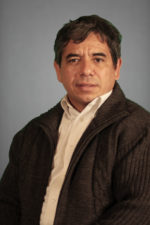Guatemalan Immigrant Works to Boost Earnings for Small U.S. Farms
Date: April 24, 2017
Reginaldo Haslett-Marroquin was born and raised in Guatemala and came to the United States in 1992 after his wife, Amy, who was born and raised in the United States, enrolled in a master’s degree program at the University of Minnesota. “We had made education part of our promise to each other, so I packed up and here we are,” he says. Haslett-Marroquin, who is now a U.S. citizen, had been a successful entrepreneur and farmer in his home country, and was determined to replicate his success in America. He has since helped launch more than 10 new businesses — including Peace Coffee, a popular Minneapolis-based business that employs 41 full-time workers — and is currently the chief strategy officer at Main Street Project, in Northfield, a nonprofit that is developing a scalable poultry production system for small farms and immigrant farmers.

“It’s a free-range system that incorporates native perennial crops, which increases efficiency and reduces costs, providing an opportunity for small farmers and, for the community, economic development,” he says. The system is currently being prototyped at a 100-acre research and training farm and at a 42-acre commercial operation, both in central Minnesota. A partnership has been established to engage investors in a regional deployment strategy in southeast Minnesota. The system is designed to serve farms as small as 1.5 acres and promises a much greater financial output. “On the same space that currently produces a dollar in traditional farming, we can produce up to $8,” Haslett-Marroquin says. That, coupled with the system’s small scale, provides a smoother entry into the business for outsiders and a path to economic independence for small farmers.
Anybody who can prove they live decent, honorable lives, are willing to work hard and make the sacrifices immigrants make, deserves recognition.
“When I first came here, I wanted to farm, but there were too many barriers as an immigrant, the first of which is land,” he says. “Large, established farmers are not interested in innovation. But if we market this with small farmers in mind, we’re giving them a chance to be competitive. And that makes us naturally compatible with immigrant farmers.” In Minnesota’s Second Congressional District, which is home to Northfield, immigrants make up nearly 8 percent of the population, accounting for $1.4 billion in spending power, according to New American Economy research. Creating a path to greater financial success will only have a positive impact on the Northfield community.
Haslett-Marroquin would like to see reform that embraces hardworking immigrants, gives them a path to citizenship, and stops ignoring their contributions to local economies. “These folks are not stealing anyone’s wages or retirement or jobs,” he says. “If we start deporting people, it will throw companies and farms and the economy into a tailspin. We should acknowledge their impact and give them a path to citizenship. With precautions of course, but anybody who can prove they live decent, honorable lives, are willing to work hard and make the sacrifices immigrants make, deserves recognition. If that doesn’t sound like a citizen, then I don’t know what does.”
